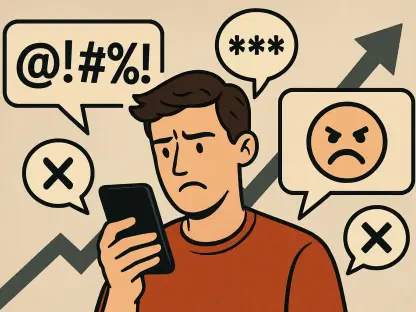The rapid expansion of social media platforms has revolutionized communication and information sharing, but it has also sparked significant concern regarding its effects on children’s mental health. As studies and anecdotal evidence increasingly indicate a link between excessive screen time and mental health issues among the youth, governments worldwide are beginning to take stringent measures to address these potential harms. Peter Kyle, the UK’s Tech Secretary, recently signaled that banning social media access for children under 16 is on the table if platforms fail to uphold their duty of care to young users. This stance underscores a broader governmental initiative to understand and mitigate social media’s impact on youth well-being.
Governmental Initiatives and Research
UK’s Approach to Social Media Regulation
The UK government has commenced a rigorous review aimed at further investigating social media’s influence on children’s mental health. This initiative builds upon a 2019 study conducted by the UK’s Chief Medical Officers, which identified a correlation between excessive screen time and mental health problems among children—though it stopped short of establishing direct causation. Nonetheless, the findings have prompted significant legislative interest in the realm of online safety for minors.
Additionally, former UK Prime Minister Rishi Sunak had considered a ban on smartphones for children, reflecting growing societal apprehension about digital content consumption by younger demographics. This sentiment has been echoed by the current Labour-led UK government, which aligns itself with the policy of informing Ofcom, the communications regulator, for upcoming regulations in the digital space. The Online Safety Act, passed recently, grants Ofcom the authority to impose penalties on digital content providers and social media companies that fail to prevent harmful materials from being accessible to children.
Expanding Regulatory Frameworks
Recognizing the urgency of the situation, Peter Kyle has highlighted several new priorities for Ofcom. Among these are the integration of safety measures into the design phase of social media platforms, ensuring transparency in operations, maintaining regulatory flexibility, fostering an inclusive and resilient digital environment, and incorporating emerging technologies into regulatory strategies. These steps are designed to build a comprehensive framework that can evolve alongside the rapid advancements in social media technologies.
This tightening of regulations stems from mounting demands for more stringent oversight, primarily following a 2021 report by The Wall Street Journal. The report alleged that Meta, the parent company of Instagram, was aware of the detrimental effects Instagram had on teenage girls’ mental health. Since the report’s publication, there has been a concerted push both within the government and public domains to ensure more robust regulatory mechanisms are in place to protect the vulnerable child demographic from potentially harmful online content.
Global Response to Social Media’s Impact
Australia’s Stringent Measures
Globally, governments are also stepping up their regulatory efforts. For instance, Australia has committed to banning social media usage for children under 16—a move that underscores the country’s proactive stance on the issue. The motivation behind this stringent measure is to prevent mental health issues that could arise from prolonged exposure to harmful digital content.
Australian regulatory bodies are committed to constructing an environment that promotes online safety for children. They have emphasized the need for comprehensive age-verification processes to ensure younger demographics do not bypass restrictions. By focusing on preventive measures and accountability, Australia sets a precedent for how regulatory frameworks can adapt to the ever-evolving landscape of social media.
The Role of Parental Controls and Verification
Social media giants are not entirely passive in these regulatory evolutions. In response to the increasing scrutiny, Meta has enhanced its parental controls and partnered with Yoti, an identity verification platform, to strengthen age-verification processes. By making it more challenging for underage users to create accounts, Meta aims to diminish the risks associated with unsupervised social media use among children.
Despite these improvements, regulatory bodies remain vigilant. Recently, Ofcom fined TikTok nearly £2 million for submitting false parental control data, signaling the regulator’s readiness to act against non-compliant social media firms. This action serves as a stark reminder to tech companies about the importance of complying with regulations designed to protect young users.
Conclusion
The swift rise of social media platforms has transformed how we communicate and share information. However, it has also raised significant concerns about its impact on children’s mental health. Research and anecdotal evidence increasingly show a connection between too much screen time and mental health problems in young people. As a result, governments around the globe are starting to implement strict measures to counter these potential dangers. In the UK, Tech Secretary Peter Kyle recently stated that banning social media access for children under 16 is a possible measure if these platforms do not fulfill their responsibility to protect young users. This position highlights a broader governmental effort to grasp and lessen social media’s effects on youth well-being. This initiative aims to ensure that the mental and emotional health of younger generations is safeguarded in an age where digital interaction is ubiquitous. By holding social media companies accountable, authorities hope to create a safer online environment for children.









